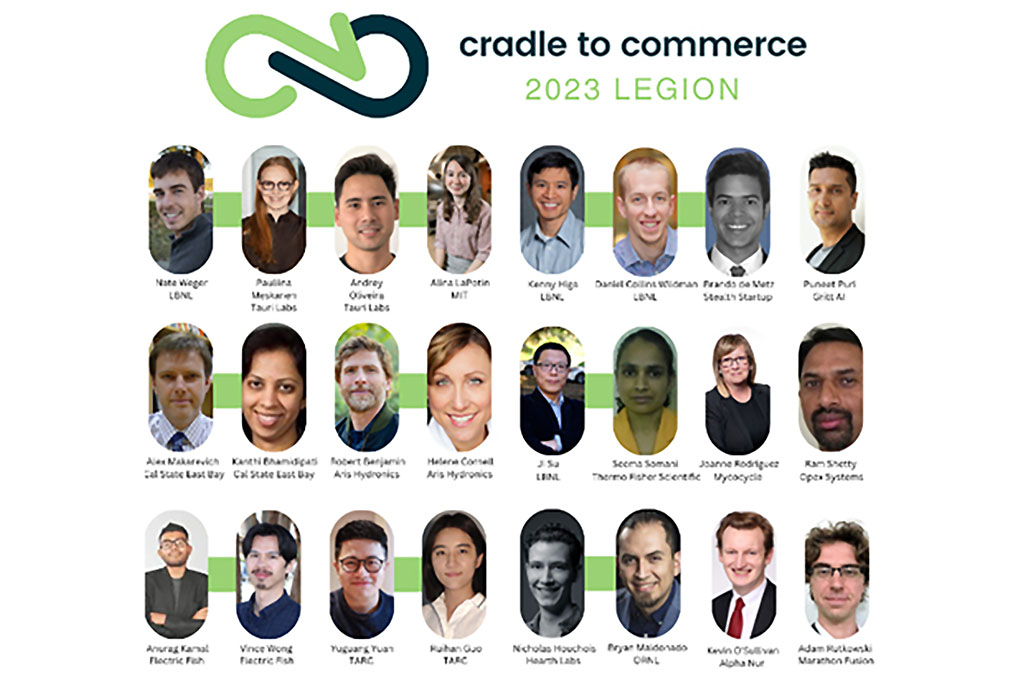The Cradle to Commerce (C2C) program, a Department of Energy Technology Commercialization Fund-supported program to accelerate the commercialization of national lab innovations, announced the selection of its first “legion” teams. The teams comprise national lab inventors and entrepreneurs who have been matched up and will receive technical and business training and mentorship, and have access to national lab user facilities and resources to support technological development.
Led by Berkeley Lab in partnership with national labs Argonne National Laboratory, Idaho National Laboratory, and Oak Ridge National Laboratory, and incubator partners One Valley, The Engine and Decisive Point, the C2C program connects national lab innovations and researchers with industry know-how to accelerate the commercialization of technologies across four clean energy domains: buildings, grid modernization & energy storage, nuclear energy, and renewable energy. As a first step, the program selected 13 inventor-entrepreneur teams from an applicant pool of over 150. The selection committee included Lab domain experts, industry experts and advisors to ensure that the teams are addressing the two imperatives of carbon reduction and market need. The program’s lead, Energy Technology Area (ETA)’s Reshma Singh, has a strong vision for how the program can help in the climate fight, “Through the dedicated efforts of C2C, we envision a future where the business mindset and carbon mindset converge, paving the way for C2C teams to drive sustainable innovation and transformative change.”
Berkeley Lab leads the C2C Management Office and one of the four domains in the program, Renewable Energy. For the Renewable Energy domain, four teams were selected to participate in the first (training) phase of the program:
- Team Mantatherm: ETA’s Nate Weger, with Pauliina Meskanen and Andrey Oliveira of Tauri Labs, aim to commercialize Weger’s patent-pending innovation, “Conductive ceramic composites for high temperature thermal energy storage”
- Team AmPower: Alex Makarevich and Kanthi Bhamidipati from California State University East Bay, with the support of C2C and national lab resources, aim to commercialize their zero-emissions hydrogen-electric powertrain with onboard hydrogen generation for marine decarbonization, as well as related national lab IP
- Team MPH: ETA’s Ji Su and Seema Somani of Thermo Fisher Scientific aim to commercialize Su’s patent-pending technology, “Homogeneous Ternary Liquid Metal System for Highly Efficient Clean Hydrogen Production from Methane”
- Team Gritt AI: Puneet Puri of Gritt AI aims to commercialize the startup’s advanced robotics and AI solution for automating the construction of clean-energy infrastructure, as well as related national lab IP
The domain experts for the renewable energy domain, Berkeley Lab’s Doug Black and Galen Barbose, were on the selection committee reviewing the applications related to renewable energy, along with more than 50 industry experts. “As renewable energy continues to revolutionize the global landscape,” shared Galen, “it holds the power to not only redefine our energy systems but also forge a path toward a cleaner and more sustainable future for generations to come.”
While Berkeley Lab leads the renewables domain in its tech-to-market journey, Berkeley Lab scientists and technologies also play a vital role in other domains within the C2C program. ETA researchers Kenny Higa and Daniel Collins-Wildman’s innovation, Novel Flow-Assisted Battery for Long Duration Energy Storage, has been selected for the Grid Modernization & Energy Storage domain, and the Energy Sciences Area’s Junqiao Wu and Jiachen Li’s Temperature-adaptive Radiative Coating (TARC) for All-Season Household Thermal Regulation innovation has been selected for the Buildings domain. The researchers will be partnering with private sector entrepreneurs to accelerate the technology transfer of their innovations.
Over the course of the next month, the teams will undergo intensive training on pitching and entrepreneurial mindset development from C2C partner Decisive Point and begin formulating technology development plans with the inventors and domain leads. The Legion phase will culminate in a Legion Pitch Day on July 11 at the Boston, MA site of The Engine, an incubator and C2C partner. The teams will pitch their technology to a panel of judges; Six teams will move on to the C2C “cohort” phase where they will conduct tech development at national lab test beds and gain further entrepreneurial and business model training from partner The Engine.
To find out more about the C2C program, visit c2c.lbl.gov.
